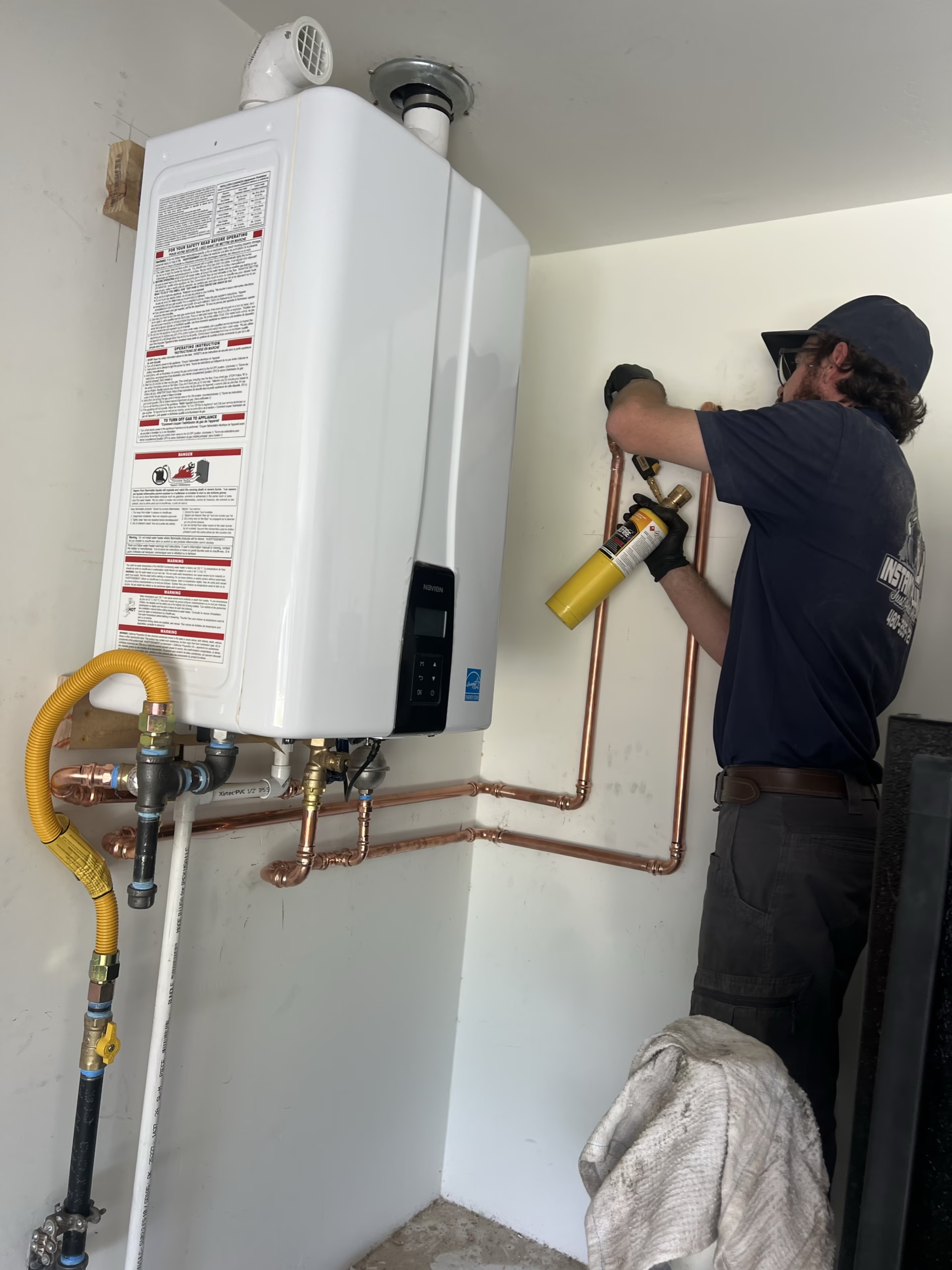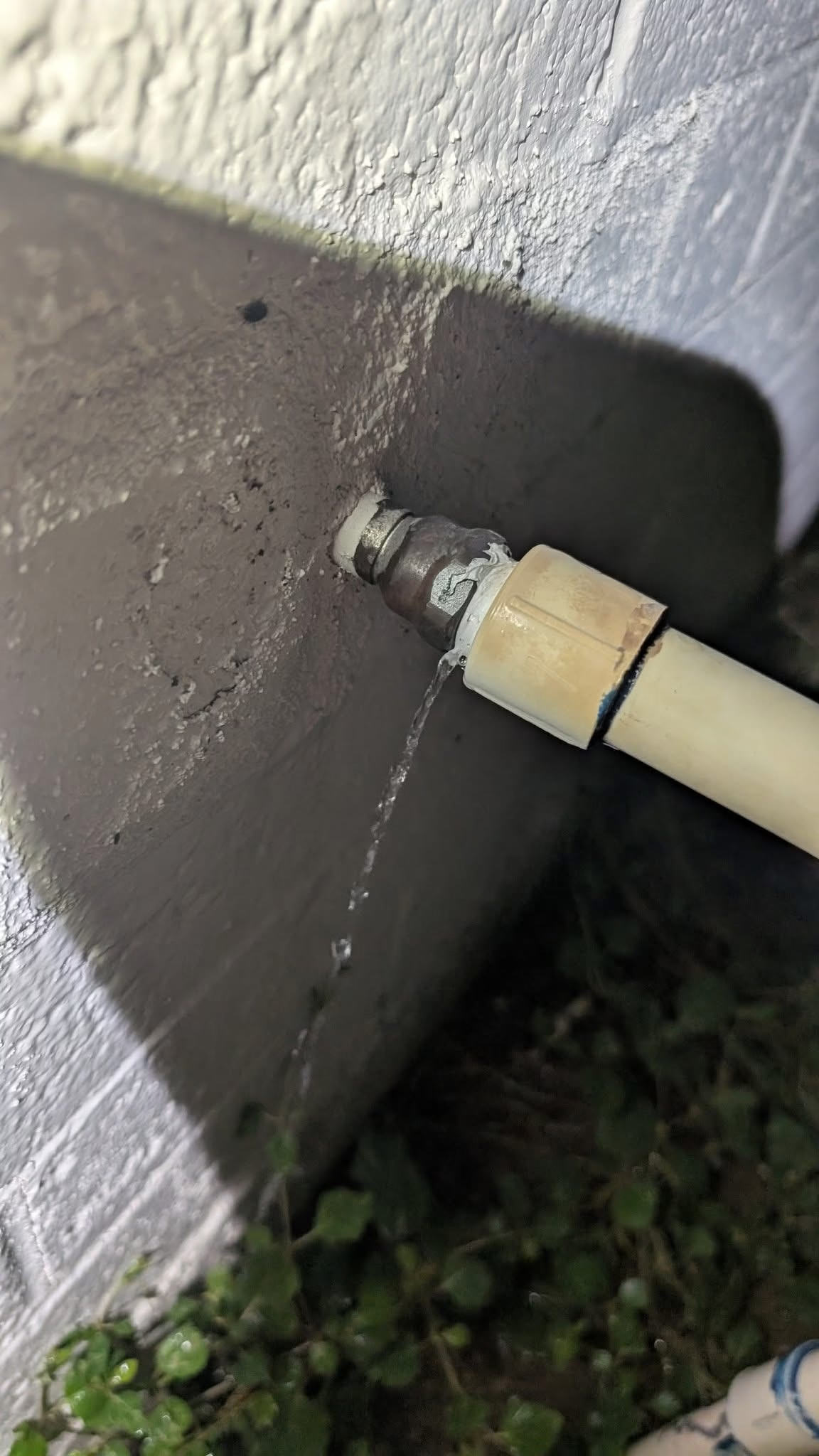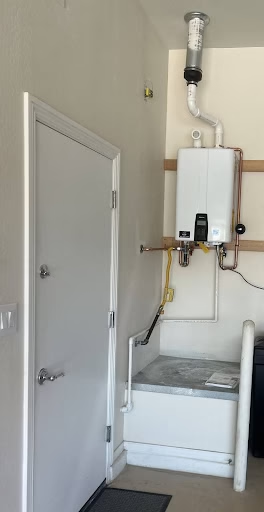There’s a moment of dread every homeowner knows. You’re in your kitchen or bathroom, and you hear a sound you don’t recognize coming from your home’s plumbing. Maybe it’s a sudden pop, a sharp knock, or a low-pitched grinding sound. When you figure out it’s coming from your tankless water heater, your mind starts to race. Is it about to break down? Is this a sign of a major, expensive problem? Do I need to shut it off right now?
We get it. The feeling of uncertainty and a little bit of fear is completely normal when an essential appliance starts acting up. You depend on your tankless water heater for a steady supply of hot water, and any sign of trouble can feel like a big deal. For over two decades, we’ve helped homeowners in Glendale, Phoenix, Scottsdale, and all over Arizona with these exact problems. Our goal isn’t just to fix the issue, but to give you peace of mind by explaining exactly what’s happening and what you need to do about it.
This article is designed to be your plain-English guide to the strange sounds coming from your water heater. We’ll break down what each noise means and explain the simple reasons behind them. You’ll learn how to identify the problem and understand the best way to solve it, whether it’s a simple fix or something that requires a pro. By the time you’re done reading, you’ll have a clear understanding of what’s going on and feel more confident about how to handle it.
Decoding the Sounds: Is Your Tankless Water Heater in Distress?
Tankless water heaters are incredibly reliable machines, but they can’t exactly talk to us. Instead, they communicate through a variety of sounds. Some noises are completely normal, like the soft hum of the fan or the gentle click of the ignition. But other sounds are a clear signal that something isn’t right. Learning to tell the difference is the first step in protecting your investment and your home’s hot water system.
A single, isolated noise might not be a big deal, but when it becomes a regular occurrence or gets louder over time, it’s a sign that you need to pay attention. The good news is that most of these problems are very common and have straightforward solutions.
Common Causes Behind a Noisy Tankless Water Heater
When your tankless water heater starts making a racket, it’s almost always a symptom of one of a few common issues. Let’s dive into what each specific noise might mean.
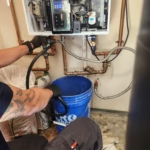
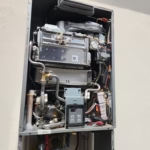
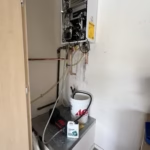
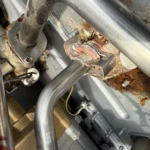
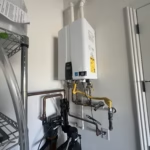
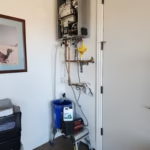
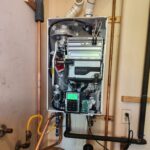
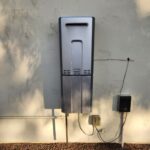
Mineral Buildup and Hard Water: The Popping Sound
This is probably the most common issue we see in the Glendale and Phoenix area. Arizona has notoriously hard water, which means our water is packed with minerals like calcium and magnesium. These minerals don’t just disappear; over time, they start to stick to the inside of your tankless water heater’s heat exchanger. This process is a bit like plaque buildup in a kettle.
As these mineral deposits build up, they create a barrier between the heating elements and the water. When the unit heats the water, the trapped water under these mineral deposits can turn to steam and suddenly burst, making a loud popping or crackling sound. It sounds a bit like popcorn popping inside your water heater. This popping noise isn’t just annoying—it’s a sign that the system is struggling to heat the water efficiently. The more buildup, the harder the unit has to work, which can lead to higher energy bills and, eventually, a damaged heat exchanger.
Water Pressure Issues: The Banging and Knocking
Have you ever heard a loud bang or knock when you turn on or off a faucet in your house? This is a phenomenon known as “water hammer,” and it can also happen with your tankless water heater. This occurs when a fast-moving stream of water is suddenly stopped by a closed valve (like a faucet being turned off quickly). The force of the water hitting the valve and the pipe walls creates a shockwave that travels through your plumbing system, resulting in a loud banging noise.
While this isn’t a problem with the water heater itself, it can put unnecessary stress on your entire plumbing system, including the connections to the unit. If the banging is happening consistently, it could mean your home’s water pressure is too high. A professional plumber can check your pressure and install a pressure-reducing valve to prevent this from happening and protect your pipes and appliances.
Dirty or Malfunctioning Fan: The Grinding and Squealing
Unlike a traditional tank water heater, a tankless unit has a built-in fan to vent exhaust gases safely out of your home. This fan is an essential part of the system, and like any fan, it needs to be clean and well-maintained to work properly.
If you hear a grinding, squealing, or scraping sound coming from your unit, it’s a strong indication that the fan is dirty or wearing out. Over time, dust, debris, and even small bugs can get into the fan assembly, which can cause the blades to become unbalanced or obstructed. A fan that isn’t spinning smoothly can’t vent gases properly, which could be a safety hazard. If the bearings in the fan motor are wearing out, they will often make a high-pitched squealing sound. In either case, it’s a clear sign that the fan needs to be cleaned, repaired, or replaced by a professional.
Loose Components: The Rattling or Buzzing
Your tankless water heater is a complex machine with many small parts, including screws, panels, brackets, and pipes. The vibrations that occur during normal operation can, over time, cause these components to loosen up.
If you hear a rattling or buzzing sound that seems to get louder when the unit is running, a loose component is the most likely culprit. It could be something as simple as a panel that isn’t fully tightened or a loose screw. While this might not seem like a serious problem, a loose component can eventually cause damage to other parts of the system if left unchecked. A good plumber will always check and tighten all connections and components during a maintenance visit.
Flow Sensor Problems: The Erratic Humming
The flow sensor is a critical part of your tankless water heater. It’s what tells the unit that you’ve turned on the hot water and that it’s time to fire up and start heating. It’s a bit like the brain of the system.
If this sensor becomes dirty or starts to fail, it can have trouble reading the flow of water accurately. This can cause the unit to cycle on and off rapidly, which you might hear as a series of clicks and an erratic humming or buzzing sound. You might also notice that your hot water temperature is inconsistent—sometimes it’s hot, sometimes it’s lukewarm. A professional plumber can diagnose if the flow sensor is the issue and either clean it or replace it to restore proper function.
What to Do About a Loud Tankless Water Heater
When your tankless water heater starts making strange noises, it’s important not to panic. Here’s a simple two-step plan for what to do next.
Simple DIY Troubleshooting Steps You Can Take
Before you call a plumber, there are a few things you can check on your own:
- Listen Carefully: Try to pinpoint exactly where the noise is coming from. Is it from inside the unit? Is it coming from a nearby pipe? The more information you can give a plumber, the faster they can diagnose the problem.
- Check the Fan: If you suspect a dirty fan, you can visually inspect the area around the fan for any visible debris or obstructions. If the power is off and it’s safe to do so, you can gently clean any dust or cobwebs from the exterior.
- Inspect for Loose Parts: Gently check the outside of the unit to see if any panels or connections feel loose. If you find something that’s rattling, you can often tighten it with a screwdriver. Remember to never open the unit or tamper with the internal components yourself.
When to Call a Professional Plumber
For any problem more complex than a loose screw, it’s time to call in a pro. Why? A tankless water heater involves gas, electricity and water lines, all of which can be dangerous to work with if you don’t know what you’re doing. A professional plumber has the tools, training, and experience to safely diagnose and fix the problem.
If you’re hearing popping, banging, or grinding noises, a professional will know exactly what to look for, from mineral buildup to a worn-out fan. They can perform a safe and effective flush, check the water pressure, or replace a faulty part, saving you from a more expensive repair down the road. It’s always a good idea to trust a licensed and insured professional with something as important as your home’s plumbing.
Proactive Maintenance: Your Long-Term Solution to a Quiet Water Heater
The best way to prevent a noisy tankless water heater is with regular maintenance. Just like your car needs a regular oil change, your tankless water heater needs a little care to run smoothly and efficiently for years to come.
The Importance of Annual Flushing
The number one thing you can do to prevent mineral buildup and the dreaded popping noise is to have your system professionally flushed once a year. This process involves a plumber hooking up a special pump and solution to your water heater to circulate and flush out all the mineral deposits that have built up. This not only keeps the unit quiet, but it also improves its efficiency and extends its lifespan. We see a lot of tankless heaters that are only a few years old get damaged because they haven’t been flushed properly. Don’t let that happen to you!
Regular Inspection and Component Checks
During a maintenance appointment, our team at Instant Plumbing doesn’t just flush the system. We’ll also do a full inspection of all the key components, including:
- Checking the water pressure: We’ll make sure it’s within the right range to prevent banging noises.
- Inspecting the fan: We’ll clean the fan and check its operation to prevent grinding or squealing.
- Tightening all connections: We’ll ensure all brackets, panels, and internal components are secured to eliminate rattling.
- Testing the flow sensor: We’ll check that the sensor is working correctly and not causing any erratic cycling.
These simple, preventative steps can save you a lot of headaches and money down the line. It’s a small investment for the peace of mind of knowing your system is running safely and efficiently.
Don’t Ignore the Noise: Why Timely Repairs Matter
You might be tempted to ignore a new noise from your water heater, hoping it will go away. We strongly recommend that you don’t. A strange sound is almost always the first sign of a problem that will only get worse. Ignoring a loud tankless water heater can lead to:
- Decreased Efficiency: Mineral buildup and other issues make the unit work harder, increasing your energy bills.
- Damage to Components: A loose part can eventually break something more expensive.
- System Breakdown: A minor issue can escalate into a major failure, leaving you without hot water when you need it most.
- Safety Risks: A blocked or dirty fan can prevent the safe venting of gases, which can be a serious issue.
By acting quickly and calling a professional, you can resolve the issue before it turns into a major emergency.
Your Glendale, AZ Experts for Tankless Water Heater Repair
We’ve been serving the greater Phoenix area with plumbing solutions since 2001, and our commitment is to provide honest, straightforward service you can trust. If you’re hearing a popping, banging, or grinding noise from your tankless water heater, don’t wait. Our team at Instant Plumbing is ready to help you diagnose the problem and get your system back in perfect working order. We’ll explain what’s going on in a way that makes sense, and we’ll always discuss the best solution for your home. We’re here to provide the peace of mind that comes with a quiet, reliable plumbing system.
Frequently Asked Questions
Q: Is it normal for a tankless water heater to make any noise at all?
A: Yes, it is. You’ll hear the normal operating sounds like the fan starting up, the ignition clicking, and the gentle hum of the unit. These sounds are usually soft and consistent. If you start to hear new or loud noises like popping, grinding, or banging, that’s when you should be concerned.
Q: How often should a tankless water heater be flushed?
A: We recommend having your tankless water heater flushed annually. In areas like Glendale and Phoenix with very hard water, this is especially important to prevent mineral buildup that can damage the unit and reduce its efficiency.
Q: Can I fix a noisy tankless water heater myself?
A: While you can take some simple troubleshooting steps like checking for rattling panels or listening closely to the sounds, it is not recommended that you open the unit or attempt complex repairs yourself. Tankless water heaters involve gas, electricity and plumbing, and working on them without proper training can be dangerous, and may void a manufacturer warranty. It’s best to call a professional plumber.
Q: What is “hard water” and why does it affect my water heater?
A: Hard water is water that contains a lot of dissolved minerals, especially calcium and magnesium. When this water is heated, these minerals can solidify and form a crusty buildup on the inside of your pipes and appliances. This buildup is the main cause of the popping noise in tankless water heaters and can significantly reduce their lifespan.
Q: What is the most common cause of loud noise in tankless water heaters in Arizona?
A: Without a doubt, the most common cause is mineral buildup from hard water. The popping and crackling sounds are a direct result of these deposits building up on the heat exchanger. This is why regular flushing is so critical for homeowners in Glendale, Peoria, Mesa, and other areas with hard water.



